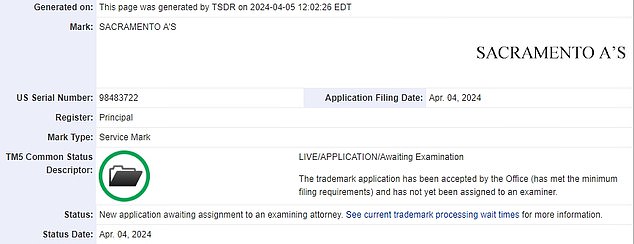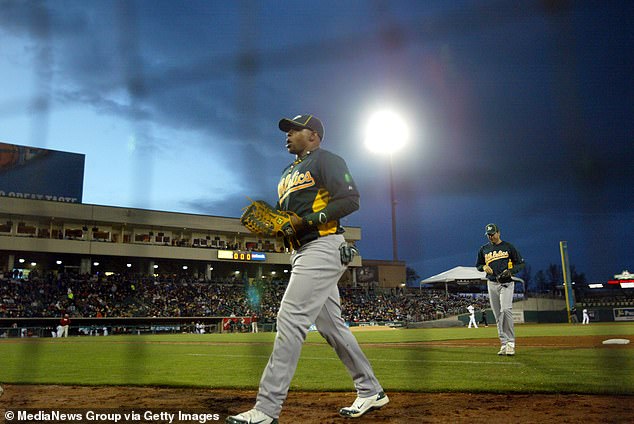As the Oakland A’s prepare to flee the Bay Area for a three-year stint in Sacramento, the major league club has filed for a pair of new trademarks to reflect its temporary home in California’s capital.
The A’s have no current plans to adopt ‘Sacramento’ as part of the team’s official name. Regardless, the team has filed for trademarks for ‘Sacramento A’s’ and ‘Sacramento Athletics.’
The trademark application includes a number of potential uses for the two expressions, including merchandise, sweepstakes, entertainment services, baseball games, and even sports clinics and camps.
The A’s will leave Oakland after this season and will temporarily play in a minor league park near Sacramento until their planned new stadium in Las Vegas is built.
The A’s announced Thursday the decision to play at the home of the Sacramento River Cats from 2025-27 with an option for 2028 after failing to reach an agreement to extend their lease in Oakland during that time.

The trademark application contains many potential uses, including clinics and summer camps.


The Oakland Athletics will move to the home of the Triple-A River Cats in Sacramento
Sacramento Kings owner Vivek Ranadivé, who also owns the minor league River Cats, said the region has the potential to become a “sports mecca.”
“We have an incredible community and a passionate fan base – the best fans in the world,” Ranadivé said. “Today’s announcement marks the next chapter of professional sports in Sacramento.”
Ranadivé joined A’s owner John Fisher and local officials to announce the news at Sutter Health Park in West Sacramento, where the A’s will play for the next three seasons. The stadium is directly across from the historic yellow Tower Bridge that connects the city to downtown Sacramento.
It is in an area where new restaurants, bars and apartment complexes have opened in recent years and is about a mile from the state Capitol and the NBA arena where the Sacramento Kings play. The stadium has 10,624 fixed seats and currently seats 14,014 fans with grass seating and standing room.


The team will remain in the capital of California from 2025 until its final move to Las Vegas
Ranadivé hopes the move is a step toward the Sacramento region eventually hosting a permanent MLB team.
Fisher said West Sacramento was among several locations, including the Oakland Coliseum, being considered for the team’s temporary home.
“Even with the long-standing relationship and good intentions of all parties in the negotiations with Oakland, the conditions for reaching an agreement seemed out of reach,” he said in a statement, adding that he understands the move will disappoint many fans. .
Oakland Mayor Sheng Thao said in a statement that the city “offered a fair deal for the A’s and a fiscally responsible deal for our city.” Thao said the city will now work to acquire the A’s rights to the Coliseum site and focus on redevelopment efforts in the area.
Paul Freedman, co-founder of the Oakland Ballers, called news of the move heartbreaking but said he is proud that fans can still support the newly formed minor league team.
“Today is a difficult day, but no one can be defeated if you never give up,” Freedman said in a statement. “Let’s build something great together.”
The A’s announced their intention to move to Las Vegas last April, and MLB owners unanimously approved the request to move in November.
The team is the most transitory in baseball. Las Vegas will be the fifth home of a franchise that began as the Philadelphia Athletics from 1901 to 1954, then played in Kansas City until 1967 before moving to Oakland.


Bay Area fans vigorously protested the relocation during the team’s home opener.
The decision angered fans in Oakland and the team’s low attendance dropped precipitously with the club drawing a league-low 832,352 fans to the aging Coliseum last season. The A’s drew 13,522 fans on opening night this year and a few thousand more protested Fisher in the parking lot, failing to reach 7,000 fans in any of the next six games.
But Thursday’s news is welcome for baseball fans in Sacramento. West Sacramento Mayor Martha Guerrero said the move will help put the city “on the map” and generate new business for local bars and restaurants.
“We’re going to make this beautiful, intimate place a welcoming, welcoming environment,” he said. “We are very excited about this historic day because it has been a dream for West Sacramento to have a Major League team here.”
The stadium will likely need additional work to upgrade clubhouses, batting and other facilities to accommodate a major league team.
“The MLBPA has had preliminary discussions with MLB on a number of issues related to the temporary relocation and we expect those discussions to continue,” the players’ union said in a statement.
The team will be known simply as the Athletics, or Athletics, without a city designation during its time in Sacramento.


Yoenis Céspedes (52) returns to the dugout during a 2012 exhibition in Sacramento
The River Cats will continue playing in their stadium for the next three years and will share it with the A’s.
By staying in Northern California, the A’s hope to keep a large portion of their local television rights in the hands of NBC Sports California, which is reportedly worth $67 million a year.
With the departure of the Oakland Athletics after this season, the Coliseum complex that was also once home to the NFL’s Raiders, the NBA’s Warriors and the NHL’s Seals will be without major sports teams.
Those teams combined to win 10 championships while in Oakland: four each for the A’s and Warriors and two each for the Raiders. The only cities with more combined MLB, NBA and NFL titles since the A’s came to Oakland in 1968 are Los Angeles, Boston and New York.
